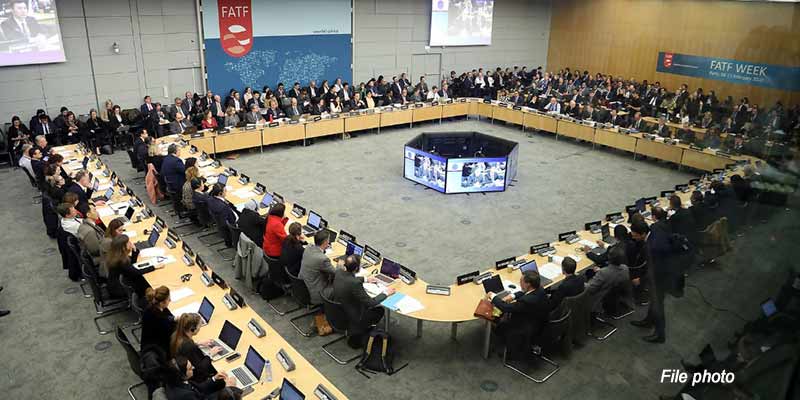- World
- Jun 26
Explainer / FATF’s Grey List and Black List
• The Financial Action Task Force (FATF) retained Pakistan on its “Grey List” for failing to check money laundering, leading to terror financing, and asked Islamabad to investigate and prosecute senior leaders and commanders of UN-designated terror groups, including Hafiz Saeed and Masood Azhar.
• FATF added Malta, Haiti, the Philippines and South Sudan to its “Grey List” of countries under increased monitoring.
• Ghana has been removed from the “Grey List” after the country had made progress.
• FATF president Marcus Pleyer said the decision has been taken at the conclusion of the virtual plenary of the Paris-based organisation.
What is the FATF?
• The FATF is an inter-governmental body established in 1989 by the ministers of its member jurisdictions.
• The objectives of the FATF are to set standards and promote effective implementation of legal, regulatory and operational measures for combating money laundering, terrorist financing and other related threats to the integrity of the international financial system.
• The FATF is a policymaking body that works to generate the necessary political will to bring about national legislative and regulatory reforms in these areas.
• The FATF currently has 39 members including two regional organisations — the European Commission and Gulf Cooperation Council.
• India is a member of the FATF consultations and its Asia Pacific Group.
The FATF has two types of lists:
1) High Risk Jurisdictions Subject to a Call for Action (Black List)
2) Jurisdictions under Increased Monitoring (Grey List).
1) Black List
• High-risk jurisdictions have significant strategic deficiencies in their regimes to counter money laundering, terrorist financing, and financing of proliferation.
• This list is referred to as the “Black List”.
• For all countries identified as high-risk, the FATF calls on all members and urges all jurisdictions to apply enhanced due diligence, and, in the most serious cases, countries are called upon to apply counter-measures to protect the international financial system from the money laundering, terrorist financing, and proliferation financing risks emanating from the country.
• Iran and North Korea are on the FATF “Black List”.
2) Grey List
• Countries that are considered as safe havens for supporting terror funding and money laundering are included in the “Grey List”.
• Jurisdictions under increased monitoring are actively working with the FATF to address strategic deficiencies in their regimes to counter money laundering, terrorist financing, and proliferation financing.
• When the FATF places a jurisdiction under increased monitoring, it means the country has committed to swiftly resolve the identified strategic deficiencies within agreed timeframes and is subject to increased monitoring.
• This list is referred to as the “Grey List”.
• The FATF and FATF-style regional bodies (FSRBs) continue to work with the jurisdictions below as they report on the progress achieved in addressing their strategic deficiencies.
• The FATF calls on these jurisdictions to complete their action plans expeditiously and within the agreed timeframes.
Countries on the Grey List:
• Albania
• Barbados
• Botswana
• Burkina Faso
• Cambodia
• Cayman Islands
• Haiti
• Jamaica
• Malta
• Mauritius
• Morocco
• Myanmar
• Nicaragua
• Pakistan
• Panama
• Philippines
• Senegal
• South Sudan
• Syria
• Uganda
• Yemen
• Zimbabwe
Removal of Ghana from the “Grey List”
• The FATF welcomed Ghana’s significant progress in improving its AML/CFT regime. Ghana has strengthened the effectiveness of its anti-money laundering and combating the financing of terrorism (AML/CFT) regime and addressed related technical deficiencies to meet the commitments in its action plan regarding the strategic deficiencies that the FATF identified in October 2018.
• Ghana is therefore no longer subject to the FATF’s increased monitoring process. Ghana will continue to work with the Inter-Governmental Action Group against Money Laundering in West Africa (GIABA) to further improve its AML/CFT regime.
Why is Pakistan retained in the Grey List?
• Pakistan was placed on the grey list by the FATF in June, 2018 and was given a plan of action to complete it by October, 2019. Since then the country continues to be in that list due to its failure to comply with the FATF mandates.
• Pakistan has completed 26 of the 27 action items given to it in 2018.
• The FATF asks Pakistan to continue to make progress to address as soon as possible the one remaining combating the financing of terrorism (CFT)-related item by demonstrating that terror financing (TF) investigations and prosecutions target senior leaders and commanders of UN-designated terrorist groups.
• The UN designated terrorists based in Pakistan include Jaish-e-Mohammed (JeM) chief Azhar, Lashkar-e-Taiba (LeT) founder Saeed and its ‘operational commander’ Zakiur Rehman Lakhvi.
• Azhar, Saeed and Lakhvi are most wanted terrorists in India for their involvement in numerous terrorist acts, including 26/11 Mumbai terror attacks and bombing of a CRPF bus in Jammu and Kashmir’s Pulwama district in 2019.
• With Pakistan’s continuation in the “Grey List”, it is increasingly becoming difficult for the country to get financial aid from the International Monetary Fund (IMF), World Bank, Asian Development Bank (ADB) and the European Union, thus further enhancing problems for the neighbouring country which is in a precarious financial situation.
Manorama Yearbook app is now available on Google Play Store and iOS App Store


